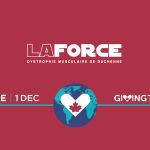
September 7 is World Duchenne Awareness Day. On this day, we raise awareness for Duchenne and Becker muscular dystrophy (DMD and BMD) around the globe.
An initiative coordinated by the World Duchenne Organization
Together, we are stronger.
The current Corona pandemic is profoundly impacting our daily lives. It changes the way we spend time altering our habits. Although it is changing our everyday life, it cannot overrule our projects and voices.
As the Duchenne community, we are very aware of how strongly this affects us in terms of isolation, facing emergencies and adaptation. We are familiar with words as fear, pain and distance. However, World Duchenne Organization is trying to turn fear into hope, pain into resilience, and distance into closeness.
This World Duchenne Awareness Day 2020, we share a message that many people have experienced and are still experiencing: Together, we are stronger. Even after the emergency will finish, our cause will always be there, our engagement is still there, and we need every single person to be involved.
Duchenne and the brain
September 7 is World Duchenne Awareness Day. On this day, we raise awareness for Duchenne and Becker muscular dystrophy (DMD and BMD) around the globe. As every year, we have a special theme that deserves more attention: this year, that will be Duchenne and the brain. The seventh day of the ninth month represents the 79 exons in the dystrophin gene.
The same protein that is missing in the muscle, causing muscle breakdown, is also missing in the brain. This can cause problems like learning difficulties and behavioural issues such as ADD, ADHD, OCD and autism. For many families, these issues result in more stress and worries in daily life than physical problems.
This crucial neurological aspect of DMD/BMD was already recognized in 1861 when Duchenne de Boulogne first described this neuromuscular condition. In the last decades, however, most of the efforts have focused on improving outcomes related to muscle weakness. Brain involvement received less attention.
What we plea for is early screening, appropriate testing, more research and better care on this aspect of the disease. This is needed to have everyone reach their full potential.
Video from World Duchenne Organization
About DMD/BMD
Duchenne and Becker muscular dystrophy (DMD and BMD) are two muscle-wasting conditions. Mutations in the dystrophin gene cause both. A certain part of the DNA is missing, duplicated, or changed, so the code cannot be read correctly by the body. This leads to the absence of the dystrophin protein, which plays an essential role in the muscle and brain. Without dystrophin, muscle cells easily get damaged, leading to a loss of these cells and, thereby, muscle function.
This can also happen in the brain, where dystrophin is missing as well. Where Duchenne individuals have a complete lack of dystrophin, people affected with Becker muscular dystrophy have lower levels or a shorter version of this protein.
Key facts
- Duchenne and Becker muscular dystrophy are rare genetic diseases defined by muscle weakness
- The dystrophin protein cannot be made due to an error on the X chromosome
- Currently, there is no cure available for this fatal disease
- Each year, 1 in 5.000 newborn boys receive the diagnosis DMD
- Lack of awareness contributes to an average delay of diagnosis of 2,5 years
Useful links
- Facebook event page here
- Original Press Kit
- Duchenne and the Brain
- La Force DMD / Hope for Duchenne muscular dystrophy awareness day
- La Force DMD / Duchenne awareness day
- Watch and share an awareness video here.



